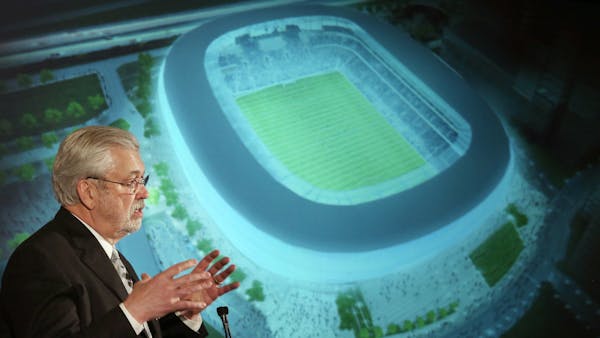The Minnesota United's vision for a $150 million soccer stadium in St. Paul's Midway neighborhood will come with an $18.4 million cost to the city, according to an estimate released Friday.
City documents break down the infrastructure costs that make up that sum: More than $3 million will go to storm sewers, $2 million for plazas, $1.5 million for water, $1.4 million for utility relocation and the list goes on.
Several City Council members said they were pleased by the $18.4 million total, $1.5 million of which is expected to be covered by grants.
"It's probably the best stadium deal for a local government and the city and the people that we've seen in recent years," Council Member Chris Tolbert said. "The city of St. Paul is not putting any money into the building of the stadium. Every dollar that we're spending is going into public uses and public infrastructure."
The team and its investors would cover the cost of the 20,000-seat open-air stadium, designed by Populous, a Kansas City-based sports architecture firm. United owner Bill McGuire has said he wants stadium construction to start in June, with the building ready to go for the 2018 Major League Soccer season.
Once completed, the city would own the stadium. But the team will be responsible for keeping up the building as it ages, city finance director Todd Hurley said.
"The development agreement is very clear that the club is responsible for all operations, all maintenance," he said.
The City Council will vote on the proposed spending Wednesday along with agreements for development, environmental project management and stadium use.
Council Member Jane Prince said she thinks the city's spending plan is reasonable but questioned whether they will be able to stick to it.
"What I need to find out is what the cap means — if the bids come in higher, if there are cost overruns, then what?" Prince said.
The council will also consider a ground lease with the Metropolitan Council for the approximately 10-acre "bus barn" site that would hold part of the stadium. The lease would cost $556,620 annually for 52 years — costs that will be covered by the team. The United would pay rent to the city, then St. Paul would turn over the money to the council, Hurley said.
"Rent is due for them to be in the stadium," he said.
The bus barn property needs environmental remediation. The cost of cleaning it up would be shared by the Met Council, which would pay $4.5 million, and the city. St. Paul would be on the hook for $1.5 million — which officials anticipate will be covered using grant money.
The Met Council site has been tax exempt for about 50 years. Officials from the city and soccer team plan to ask legislators this session to continue to keep it off the tax rolls. They also want the state to waive sales tax on construction materials for the stadium and allow the team to sell alcohol there.
A public resource
Compared to other stadium deals in the Twin Cities, the city's $18.4 million contribution is on the low end.
Across the river, Minneapolis is paying $48.5 million for the Target Center renovation and $150 million for U.S. Bank Stadium. Hennepin County taxpayers contributed $350 million to Target Field.
St. Paul channeled $24 million in grants and loans into the Saints' CHS Field.
For the United stadium, the city would cover much of its portion of the costs with existing tax increment financing districts in the area, Council Member Amy Brendmoen said.
The soccer stadium would not just be used by Major League Soccer teams.
In keeping with a request made by members of the city's Snelling-Midway Community Advisory Committee, the stadium would be available for public use. It will be open to high school soccer championships, recreational league games and other civic events, a playing-and-use agreement states.
The advisory committee also supported open space, and developers' plans include plazas.
The development agreement that City Council members will consider Wednesday says St. Paul will "enter into public private partnerships to fund green spaces or public plazas" and "collaborate with the Club and the Team on the design of public plazas and green spaces contiguous to the Stadium."
While the advisory committee has provided input, Prince said other community members need to weigh in on the project.
"I personally feel that the public process on this has not been adequate," Prince said. "It's really important to me that the public understand that Wednesday is the opportunity they have to ask these questions and make their voices heard."
Jessie Van Berkel • 612-673-4649

Marijuana's path to legality in Minnesota: A timeline
U.S. Steel won't get exception to pollution rules that protect wild rice, MPCA says

Taste of Minnesota to be enjoyed on the ground and in the air this year

Ex-Hennepin sheriff paid for drunk-driving damages with workers' comp

